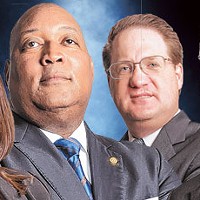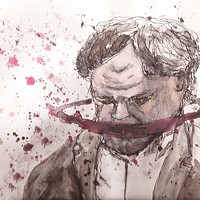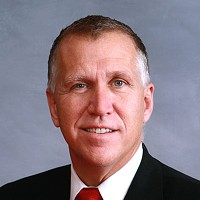Dan Clodfelter: The Gentleman's Radical
Does the current mayor have what it takes to win an election on his own accord?
By Michael A. Cooper Jr.
For three days in September 2012, the basketball arena on East Trade Street was the most important building in the U.S. As drone strikes killed terrorists in Somalia and Syria's civil war raged through an ancient city, America's oldest political party was in Charlotte to re-nominate the nation's first black president.
Brought to the Queen City by the late, longtime Charlotte leader Susan Burgess, the convention was of utmost importance to local Democrats. Anthony Foxx and Mel Watt secured roles in the Obama administration. Harvey Gantt spoke on stage. Joel Ford was an usher. Pat Cotham, Becky Carney, Beverly Earle, John Autry and Jennifer Roberts were delegates.
But Dan Clodfelter skipped town. The seven-term state senator, then running for an eighth in North Carolina's 37th district, planned a family vacation instead.
Since the Democratic National Convention, four people have served as mayor of Charlotte. Clodfelter, age 64, is the most recent, and he is different. In this partisan era, the man behind the mustache is an iconoclast. He is centrist, even-tempered and effectual, the things Americans don't hate about politics, but rarely vote for.
There's the dilemma.
The voters didn't choose Dan Clodfelter — 10 members of City Council did. Halfway through fulfilling the appointed term, Clodfelter has just filed the paperwork to run for another, and soon we'll learn whether "Mr. Clean" can win in the city that elected Patrick Cannon.
THE SCHOLAR
Fifty-six people served as mayor before Daniel G. Clodfelter; none were smarter.
His father Bill owned a Studebaker dealership, his mother Lorene was a secretary at the elementary school. At the end of a dead-end street in Thomasville, North Carolina, the kid grew up reading because, "there wasn't a lot to do in town," he says.
Waiting on Lorene to pick him up after school, he spent his afternoons in the public library. Later, he became captain of the debate team at Thomasville High, where the principal submitted his name to a new program for gifted students, the Governor's School of North Carolina.
Riots broke out across the country the summer Clodfelter attended Governor's School, where a history teacher from R.J. Reynolds High School inspired a love of civics. Graduating from Thomasville in 1968, the year Martin Luther King Jr. and Bobby Kennedy were killed, Clodfelter missed the Vietnam War with a high lottery number and a student deferment to attend Davidson College.
It was a time for choosing sides. Clodfelter sympathized with the anti-war movement, and the counterculture, but favored progressive achievement over symbolic protest. Instead of joining Students for a Democratic Society, he ran for student body president. "It was Davidson's version of activism," he says. "I was a gentleman's radical."
Clodfelter went door to door, advocating that Davidson go co-ed, and beat out four other candidates with 70 percent of the vote. After 136 years, the school soon caved on gender.
While his peers smoked dope at Woodstock or fought in the jungles of Southeast Asia, Clodfelter spent the summer of '69 attending trainings with the Center for Creative Leadership and surveying Charlotte's low-income neighborhoods as part of an internship with Duke Power.
Recruited by Davidson graduate Harrison Wellford, Clodfelter spent his second college summer working for Ralph Nader's Public Citizen, and the third with former North Carolina governor Terry Sanford, then president of Duke University.
Preparing briefing papers on urban growth issues, Clodfelter grew close with Sanford. "There was always a group over at his house, not the faculty or trustees — young people," Clodfelter says. "He became my hero."
Sanford ran for president the next year to prove George Wallace did not represent the South. Clodfelter organized field offices, recruited volunteers and attended the Democratic National Convention in Miami, where Sanford finished fifth and the party nominated anti-war candidate George McGovern.
McGovern's liberalism alienated the South, helping to elect North Carolina's first Republican governor in 76 years and Jesse Helms to a seat in the U.S. Senate. Clodfelter was disenchanted by the uncompromising nature of the times, never attended another convention, and returned to academia.
Davidson had a tradition of competing for the Rhodes Scholarship, so Clodfelter went for it. Four years after Bill Clinton set out for Oxford, England, it was Clodfelter's turn. His hair was long then, and a full beard adorned the mustache his wife Elizabeth has never seen him without.
Elizabeth Bevan's father was academic vice president at Davidson, but she was off studying on the West Coast. Clodfelter knew her entire family before he actually met her. When they finally did, a relationship blossomed quickly. They corresponded for two years while he was at Oxford, and the couple married three days after he returned.
THE LAWYER
In 1974, Clodfelter's friends at Oxford convinced him law school at Yale was easier than at Harvard, more like graduate school. So Clodfelter went to Yale, where Professor Gene Rostow sparked an interest in the field of anti-trust.
Returning to Thomasville with a law degree was off the table because his hometown was too small. But even with a job offer on Wall Street, North Carolina still felt like home for Clodfelter.
In Charlotte, Julius Chambers had filed suit in the case Swann v. Charlotte-Mecklenburg Board of Education, as poor black children still attended different schools from whites in the suburbs. Judge James McMillan, a federal judge in the Western District of North Carolina, ultimately found busing the only constitutional way to solve structural segregation.
The Supreme Court of the United States upheld McMillan's order 9-0. When Clodfelter read about the case, he applied for a clerkship with McMillan. "I applied to other judges, but they were appellate judges, and I wanted to work for a trial judge," Clodfelter says. "He was a great mentor."
The family moved to a shady spot on Kenmore Avenue, near Mercy Hospital, convenient to Uptown and the federal courthouse on West Trade. (A few years later, they moved across East 7th Street, between Hawthorne and Pecan, and stayed there. Unlike Patrick Cannon, Clodfelter never escaped to Ballantyne.)
After the clerkship, Clodfelter dropped by every firm in Charlotte. Back then, there were only 18 people at the white-shoe Moore & Van Allen. It was the right fit. "Dan was absolutely brilliant, and creative, with the most in-depth analysis of issues by any attorney I've ever seen," says Mac McCarley, a former Charlotte City Attorney.
THE SENATOR
Like Clodfelter, Charlotte City Councilman Don Carroll had, years before, gone to Davidson and clerked for McMillan. Carroll introduced Clodfelter to the key players in the city political scene, and Clodfelter got his feet wet by volunteering for Harvey Gantt's first mayoral campaign.
In the hotbed of activity that was Elizabeth in the 1980s, Clodfelter stood out to his neighbors as a future leader. He focused on planning issues, the freeway and neighborhood revitalization. He also joined the Z. Smith Reynolds Foundation as a trustee, convincing them to do a study of North Carolina's antiquated court system.
Representing east Charlotte, he served six years on City Council, and then in 1998, won a seat in the North Carolina Senate. Ranked near the top in effectiveness, Clodfelter became a powerful co-chair of the finance committee and a senior member of the judiciary committee.
Cultivating friends from rural districts, Clodfelter developed a brand as a business-friendly moderate Democrat. "His reputation in the building is unparalleled," says Jeff Jackson, the Afghanistan war veteran who was appointed to replace Clodfelter in the Senate last spring. "'Dan was for this' is the ultimate endorsement."
And his friendships went across the aisle. "He was well respected, incisive, able to cut through the excess," says Fletcher Hartsell, a Republican in the state Senate, who was also a fraternity brother at Davidson. "As a debater, in student government, and in the Senate, he wanted to figure out ways to solve problems."
But after 12 years in the majority, Clodfelter lost influence when Republicans took over Raleigh and passed a reactionary agenda opposed by a small and increasingly partisan Democratic caucus. His compromise tax reform proposal with Hartsell was shunned in favor of a more conservative version.
Clodfelter, stuck in the middle, ill-suited for the times, was destined to fade into obscurity.
Then shit hit the fan in Charlotte.
THE IDEAL CHOICE
Clodfelter was in his Moore & Van Allen office that March afternoon when he heard the news. A partner read it on Twitter.
Agents from the FBI had arrested Charlotte mayor Patrick Cannon on federal corruption charges. Cannon resigned that night — less than a year after Anthony Foxx was chosen to be President Obama's Secretary of Transportation.
When Foxx left, The Charlotte Observer ranked the individuals most likely to win the 2013 mayoral election. Clodfelter ranked first, and Cannon fourth. Clodfelter never ran. Cannon won comfortably.
"I didn't know [Cannon] all that well," says Clodfelter. "I was in Raleigh so we never worked together on anything substantial, and were not close."
The first call came within 24 hours of Cannon's arrest. "I'd always said no before, but this time was different," Clodfelter says about being mayor. "Everybody was in shock, and my way of responding was saying, 'I've got to do something, I've spent too many years, too many days and too many nights working to let this happen to my city.'"
It took 13 days for City Council to pick someone to finish Cannon's term. During those first 10, Clodfelter spoke with all of the members, even meeting councilman Michael Barnes at a fast food restaurant in Hickory Grove.
While former county commissioner Jennifer Roberts and former councilman James Mitchell had grassroots support, Clodfelter was the ideal choice: an experienced Democrat approved by the establishment, with a spotless record to reassure public and the seeming understanding that the person selected should be a placeholder, and not a candidate in 2015.
Clodfelter had the votes locked up when the Council met on April 7. LaWana Mayfield, loyal to Mitchell, was the only dissenter. Riding over to his new job, Clodfelter got stuck in traffic because of a cancelled Miley Cyrus concert. "I walked into the office that night drinking water out of a firehose," says Clodfelter.
But he never reached out to Patrick Cannon for advice.
THE MAYOR
Clodfelter, an Anglophile who drives a Jaguar, starts his day off around 6 a.m. and spends more time in the community than inside Government Center. He makes $23,000 a year; by comparison, the mayor of Richmond, Virginia, earns $125,000.
While Anthony Foxx was abrasive, often clashing with members of his own party, Clodfelter is deferential, preferring to mold consensus, which makes him better suited to fill this "weak-mayor" role. And somewhere along the way, Clodfelter's swan song as a replacement turned into a personal renaissance.
The policy wonk who never sought power and lacked any real ability to achieve it found himself in charge of one of the fastest growing cities in America, at a time when Washington is paralyzed, Raleigh continues to move backward, and citizens rely on municipal leaders for progress and innovation.
Last June, Clodfelter met with Charlotte's immigration task force about creating municipal IDs, which helps undocumented workers function without legal status. He's also advocated for Charlotte to become a "Smart City" conscious of its environmental impact and thinks the city still needs to work on its "cool factor" by appealing to young people.
And the corporate attorney, who recently moved from Moore & Van Allen to Parker Poe to practice bankruptcy and creditors' rights, joined in on the creation of a task force for economic opportunity to deal with Charlotte's status as worst in the country for upward mobility. "We have a tremendous responsibility to keep all parts of the city involved in prosperity," he says.
"Dan is very pragmatic," says Melanie Sizemore, former president of the Elizabeth Community Association, of which Clodfelter was a founder. "He understands what his powers are, what leaders can do, and what he can change."
In the midst of all that action, the bald, Moonlight Graham look-alike, with the gray mustache — brought in to restore calm before retiring — has decided he wants to stay. "You never know until you try," he says about running.
But it won't be easy.
Members of Council expected him to step aside, and will not line up behind him. Clodfelter's neighbor on Clement Avenue, Jennifer Roberts, popular among liberals, has already entered the race.
Ed Peacock III, Cannon's opponent in 2013, is still young and his website still works — he may run again. James Mitchell is interested, Michael Barnes says he'll decide in the next few weeks, and David Howard has set up a finance committee in preparation.
African Americans dominate Charlotte Democratic politics. If only one African-American candidate runs in the primary, Clodfelter and Roberts will have a difficult time securing the nomination. If Mitchell, Barnes or other black candidates join Howard, the primary is wide open.
There are other obstacles. Clodfelter raised a total of $724,164 in eight senate campaigns; Foxx raised more the last time he ran for mayor. Clodfelter has also never run city-wide, and his veteran consultant Dan McCorkle lacks 21st century tech-savvy.
And though his intellect, time spent with Sanford and experience in the state senate make him the most qualified mayoral candidate in Charlotte's history, he lacks charisma or the people's touch.
Clodfelter can win, but to do so, he must overcome his aversion to the pettiness of politics, shape his policy acumen into a vision for Charlotte, and sell it, all the while hoping the same electorate that chose a crook like Patrick Cannon is finally ready for a serious campaign about substantive issues.
Suffering through poverty and inequality, Charlotte needs upheaval. Howard and Mitchell understand the inner-city, and Roberts has the progressive instinct to challenge the status quo. But if the solution to putting people back to work is to make the system work, Clodfelter is the antithesis of everything that's broken — the real radical.
Michael A. Cooper Jr. works for the McElwee Firm in North Wilkesboro, is a 2015 New Leaders Council fellow in North Carolina, was a 2009 fellow at the Center for Progressive Leadership in Washington D.C., and has contributed to The New Republic, Charlotte Magazine and Generation Progress.
Editor's Note: This story incorrectly cited the Center for Responsive Politics. We apologize for the error.
Speaking of...
Latest in Cover
More by Michael A. Cooper Jr.
Calendar
-

Queen Charlotte Fair @ Route 29 Pavilion
-

NEW WINDOW GALLERY-Pat Rhea-ACRYLIC PAINTINGS-April 05-30 2024 VALDESE, NC 28690 @ New Window Gallery/Play It Again Records
- Through April 30, 12 p.m.
-

TheDiscountCodes
-

"Blood Residue Analysis of Paleoamerican Stone Tools in the Carolinas" @ Native American Studies Center
- Fri., April 26, 12-1 p.m.
-

Brightfire Music and Arts Festival @ GreenLife Family Farms
-
5 Online Player Communities to Join in Michigan
-
A beginners guide to online sports betting in the US
-
I Changed my Sex. Now What?
Scott Turner Schofield's rapid transit to a new identity
















